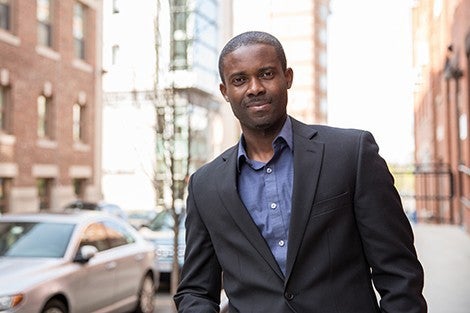May 9, 2014 —The phone call from Ghana clinched Asare Christian’s career path. His grandmother was exhibiting sudden, puzzling symptoms including loss of balance, coordination, and bladder function. To Christian, who was learning about brain injury in his clinical rotation in rehabilitation medicine at the Medical College of Wisconsin, this sounded like a case of hydrocephalus, fluid accumulation within the brain. His diagnosis was confirmed and she received surgery that saved her life. But with no physical rehabilitation services available to help her through the first months of recovery, she became disabled.
Although her physicians did all they could for her, they—along with physicians across sub-Saharan Africa—lack the resources to provide rehabilitative care, said Christian, a rehabilitation physician who is graduating this month with an MPH in Health Policy and Management. “There is a huge need for these services in this part of the world, he said. “I always wanted to contribute solutions to improving health infrastructure in environments where the need is greatest. It became clear to me that this was it.”
While he was still in medical school, Christian began working on a plan to create a medical rehabilitation program in Ghana, which has now been submitted to the Ministry of Health. He hopes eventually to return to Ghana to help oversee the training of sub-Saharan Africa’s first physicians to specialize in the field.
In the short term, Christian is weighing offers to do academic and clinical work in the United States, where he has studied and worked for 15 years. He aims to provide care for people with disabilities—both physical and mental—as well as pursue his passion for finding innovative ways to deliver care to this population. For the past year, he has been building the skills for the task as a Mongan Commonwealth Fund Fellow in Minority Health Policy, a program that offers intensive study in health policy, public health, and management at HSPH and other Harvard graduate schools for physicians committed to transforming health care delivery systems for vulnerable populations.
“In medical school, everyone had the same story. We wanted to help people. But when you start to practice, you see the limitations of the scope of acute medical care,” Christian said. “I want to improve the health of people with disabilities, not just their health care. I realized that in order to make an impact I had to understand what is happening in these patients’ lives before they come to the clinic. Public health gave me the framework for that.”
Christian currently is wrapping up his practicum project working as a consultant for New Hampshire’s Well Sense health plan. The state aims to move its Medicaid population with disabilities into private managed care plans as a way to improve quality and efficiency. Christian is creating a framework and recommendations to guide implementation of these changes in a way that achieves better care and better health at a reduced cost.
Among his key recommendations for Well Sense are to gather evidence on the unique needs of this population and eliminate wasteful processes that don’t improve their lives. “We need to do the right thing for the right patient at the right time, at all times,” Christian said. “That starts with good metrics and right now, we don’t have them for persons with disabilities in this setting.”
Along with the tools for developing policies, Christian will leave HSPH with strategies for actually getting them passed, he said. He cites a course on health care policy and politics that HSPH’s Robert Blendon, Richard L. Menschel Professor of Public Health and Professor of Health Policy and Political Analysis, taught at Harvard Kennedy School as particularly influential.
“In public health, we can be a little naïve in how we approach politicians,” Christian said. “Now I feel like I know how to diagnose a political environment to get my agenda to the table.”
Photo: Emily Cuccarese
